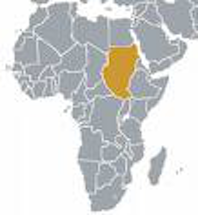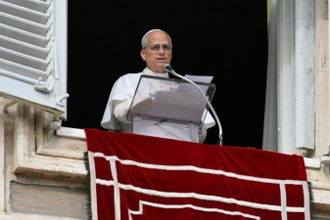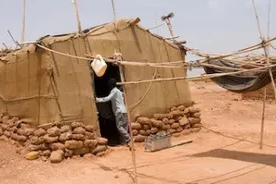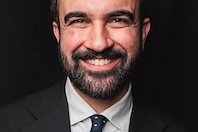Standoff continues in Sudan democracy protests

Members of Britain's Sudanese community fear that recent gains in the fight for democracy are being eroded, despite the departure of President Omer Bashir last month. Sudan's Christians, religious minorities and secularists are also concerned that the ruling transitional military council insists that Sharia law remain the primary source of Sudan's legislation.
There has been mixed news from the Sudanese capital, Khartoum, this week as civil society protesters continue their months-long sit-in. On Tuesday, the transitional military council reached an agreement with the protesters, paving the way for a three-year transition. However, on Thursday, the military suspended talks, demanding that barricades were removed and streets re-opened.
Sudan watchers believe the transitional military council is under pressure from the governments of Saudi Arabia and Egypt, wanting to discourage other Arab populations from thinking that democratic change can come from the grassroots. Both regimes are understood to be actively promoting the message that only monarchies or military dictatorships can guarantee stability in the Arab world.
The protests, which began in December, are led by the Forces for Freedom and Change, a coalition of the Sudan Call umbrella group of opposition parties and rebel groups, the Sudanese Professional Association and civil society. Sudan analysts believe protesters have learned from 2011's failed Egyptian revolution which ended with a coup retrenching the military's hold on power. Moreover, Sudanese Diaspora (with whom my NGO, Waging Peace, works) are concerned by the track record of the leaders of the transitional military council. General Burhan and General Hemeti worked together in Darfur and more recently in Yemen, where Sudan supplies ground troops to support Saudi Arabia. Hemeti leads the Rapid Support Forces (RSF) the re-branded Janjaweed militias who carried out years of ethnic cleansing in Darfur. The National Intelligence and Security Services (allegedly responsible for 30 years of torture and "disappearance" of civil rights activists), the armed forces and the police are also present on the council.
The uprising began in December when the International Monetary Fund told President Bashir that his regime must end subsidies on bread and fuel. Sudan has foreign debts of $55 billion; it is subject to sanctions due to its genocidal campaign against its non-Arab citizens; and it is on the US list of state sponsors of terrorism. These factors are impediments to accessing the international finance needed to modernise its feudal economy. The removal of subsidies was a token gesture, aimed at building international confidence in a regime that has mismanaged Sudan's finances for thirty years. Instead of removing the subsidies gradually, as the IMF suggested, the regime did it all at once. The move backfired spectacularly.
Khartoum devotes 75% of its annual budget to "security" e.g. the armed forces, the semi-autonomous RSF, and the National Intelligence and Security Service (the equivalent of the FBI or MI5). Education, health and infrastructure have been neglected for decades as a consequence.
Moreover, any non-security sector spending has benefited the patronage network of self-identifying Arab ethnic groups along the Nile. These crony capitalists made fortunes from a construction boom, while the periphery remains marginalised. Bashir's regime has also stolen massive amounts of Sudan's oil revenues, earning it the bottom ranking on Transparency International's global league table. The result has been hyperinflation, mass unemployment and brain drain.
Sudanese Diaspora in the UK warn of the persistence of Sudan's "deep state." Bashir's Islamist project began years before the 1989 military coup that brought him to power. Bashir and his colleagues systematically inserted their followers throughout society, running hospitals, the media, factories, the judiciary, universities, the clergy, the military and civil service. Their tentacles extend everywhere and are firmly entrenched.
A significant victory for the deep state is the rise of General Hemeti. Sudan watchers understand he is both running the transitional military council and in charge of the fight back against the revolution. According to Human Rights Watch, Hemeti's RSF, the rebranded Janjaweed Arab militias, are complicit in the slaughter of as many as half a million black Africans in Darfur, destroying hundreds of non-Arab villages in Darfur, and systematically raping women. Half the population of Darfur remains in IDP or refugee camps. The RSF also has 3000 mercenaries in Yemen, adding to the Sudan armed forces' 14,000 troops there, earning vital financial support from the Gulf states.
In April, Hemeti appeared in the streets, greeting protesters and calling on Bashir's regime to desist from using violence to crush the rebellion. However, the RSF has since been accused of perpetrating several attacks on the crowd, trying to break up the sit-in or punishing individual users of social media. Hemeti is unpopular with Sudan's regular armed forces, and it is feared his RSF may therefore be dispatched back to Darfur to loot and murder at will.
Unlike Bashir and his colleagues, Hemeti is not motivated by Islamism, but by a desire to impose an Arab identity on multi-ethnic Sudan. The European Union indirectly funds the RSF through the so-called Khartoum Process, to prevent migrants from the Horn of Africa from reaching the Libyan Coast. Hence, representatives of the EU and Britain were among the first diplomats to greet Hemeti following Bashir's departure. The EU and the UK have persisted with the Khartoum Process, despite evidence that the RSFs sell migrants to Libyans who hold them for ransom or sell them as slaves.
This week, the protesters and the military council agreed a three-year transition, administered by a cabinet (membership still to be determined), a sovereign council, and a legislative council (two-thirds of whom will be civilians). The military has now announced that this progress is contingent on the removal of barricades and the opening of streets. Hence the stand-off continues.


















